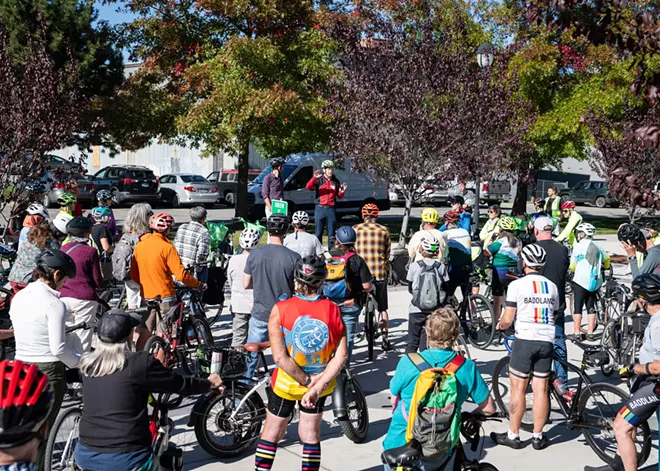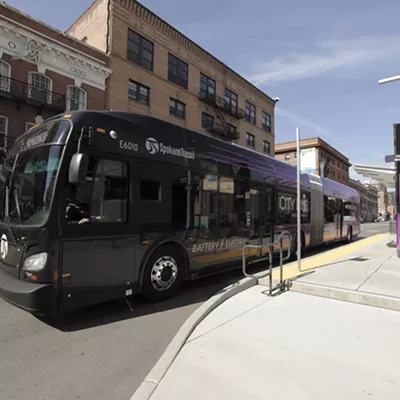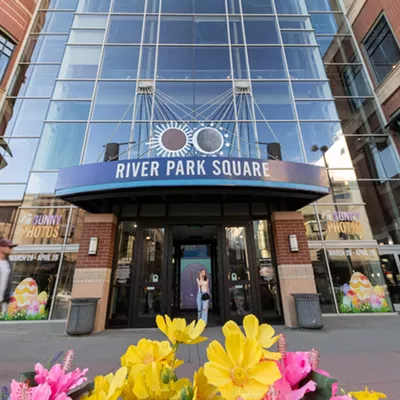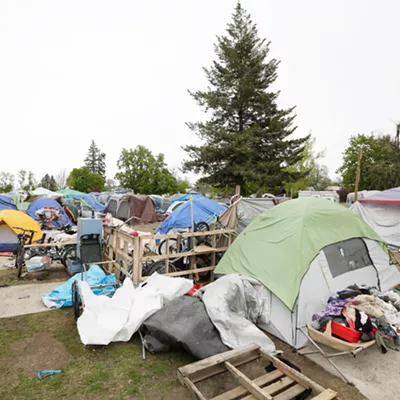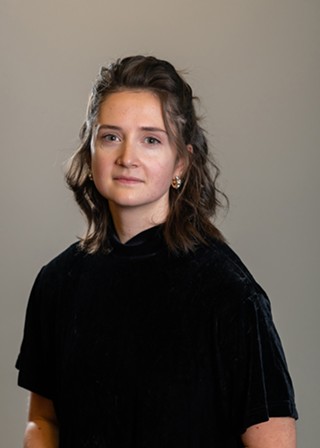"Holy smokes, this is a great turnout," says Spokane City Council member Zack Zappone as he pedals to the group of bicycles gathering at the University District Gateway Bridge. When he arranged this "bike town hall" with Washington Senate Majority Leader Andy Billig, he expected about 10 people to show up.
Instead, nearly 100 come out.
It's a sunny, 70-degree early October Friday, and riders stream in from every direction. They're in office clothes, in fluorescent vests, on road bikes, mountain bikes, Lime bikes, electric bikes and tricycles. The youngest attendees aren't in high school yet. The oldest are well into retirement. A Washington State Parks commissioner joins the fray, as do members of Spokane Bicycle Club, parents carrying child seats, and a guy on an electric unicycle.
"This just goes to show there's a lot of interest in bike infrastructure," says Billig as he turns to address the crowd.
Billig and Zappone are hosting the two-wheeled town hall to review what's happened with Spokane's bike infrastructure in the past few years and to field ideas for future projects. Billig motions to the U-District bridge that the state helped fund (which is met with cheers), then tells a story from his first bike town hall with former City Council President Breean Beggs in 2019, when an attendee told him about a law in Idaho that allowed bicycles to glide through stop signs if no cars are present. Couldn't Washington allow that, too? Billig introduced the idea to the Legislature, which became state law in 2020.
"So if you have any ideas for bills, we'll pass them," he tells the crowd.
Colin Quinn-Hurst, a planner with the city of Spokane, leads the mega group on its first leg of the ride through downtown Spokane. We merge into the bike lane going west on Riverside Avenue, the city's first (and only) protected bike lane. Groups of cyclists get stopped at each traffic light until riders are stretched along the entire drag.
"Wow, that's quite a group you guys got," says a passer-by on Howard Street.
Quinn-Hurst has to rethink the route with this many people. The entire gang stops at the fountain in Riverfront Park, where participants have their first chance to ask questions (though voices are drowned out by the construction vehicles driving past). Quinn-Hurst guides the group to a quieter spot of the Centennial Trail.
"Can we do anything about sweeping the trails?" one frustrated biker asks (which is met with more cheers).
"I don't need fancy, I just need done," another participant says, who wants some smooth pavement in the neighborhoods north of downtown.
"How did the bike get on top of the pylon?" asks a third attendee, referring to a blue bike that mysteriously appeared atop a concrete pillar in the middle of the river next to the Sandifur Memorial Bridge in People's Park. This merits the biggest reaction, and the most stumped faces. Zappone looks to Quinn-Hurst, who looks back at him, then into the crowd.
"Does anyone know?" he asks. Crickets.
Billig draws the group back. His goal, he says, is to make cycling "accessible, safe, and fun" for everyone.
Another bicyclist on her own afternoon ride overhears Billig's sentiment. She raises her hand and pumps her fist as she passes the group, cheering "Woo-hoo, I agree!" ♦
For more information, visit my.spokanecity.org/projects/bicycle-and-pedestrian-resources

